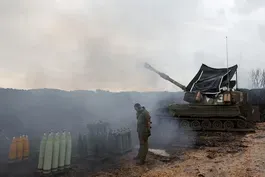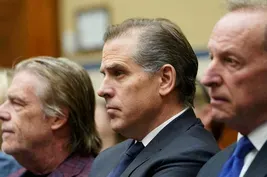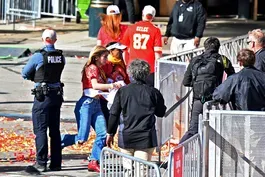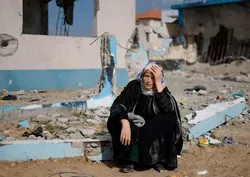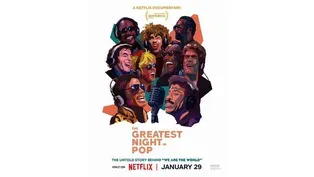
Arizona network becomes model for mental health hotlines
Clip: 2/15/2024 | 9m 34sVideo has Closed Captions
How Arizona's crisis response network became a model for mental health hotlines
Since the launch of 988, the three-digit dialing code for the National Suicide and Crisis Lifeline, millions have made contact with counselors. But the support and services available after someone calls 988 largely depend on what state one lives in. Stephanie Sy reports on how Arizona’s crisis response network has become a leading model for crisis care.
Problems with Closed Captions? Closed Captioning Feedback
Problems with Closed Captions? Closed Captioning Feedback
Major corporate funding for the PBS News Hour is provided by BDO, BNSF, Consumer Cellular, American Cruise Lines, and Raymond James. Funding for the PBS NewsHour Weekend is provided by...

Arizona network becomes model for mental health hotlines
Clip: 2/15/2024 | 9m 34sVideo has Closed Captions
Since the launch of 988, the three-digit dialing code for the National Suicide and Crisis Lifeline, millions have made contact with counselors. But the support and services available after someone calls 988 largely depend on what state one lives in. Stephanie Sy reports on how Arizona’s crisis response network has become a leading model for crisis care.
Problems with Closed Captions? Closed Captioning Feedback
How to Watch PBS News Hour
PBS News Hour is available to stream on pbs.org and the free PBS App, available on iPhone, Apple TV, Android TV, Android smartphones, Amazon Fire TV, Amazon Fire Tablet, Roku, Samsung Smart TV, and Vizio.
Providing Support for PBS.org
Learn Moreabout PBS online sponsorshipGEOFF BENNETT: Since the launch of 988 - - that's the three-digit dialing code for the national suicide and crisis lifeline -- millions of people have made contact with crisis counselors.
Call volume has jumped 40 percent compared to when the hot line was a 1-800 number.
But the supports and services available after someone calls 988 largely depend on the state where one lives.
Stephanie Sy reports on how Arizona's crisis response network has become a leading model for crisis care.
STEPHANIE SY: Music is how Raquel Medina makes sense of the world.
But around six months ago, the music stopped playing.
Her obsessive compulsive disorder and anxiety overcame her.
RAQUEL MEDINA, 988 User: I had been going through several nights where my emotions just became so big, definitely thoughts of suicide, for sure, thoughts of I'd be better if I wasn't around.
STEPHANIE SY: Even in a state of crisis, three numbers came to her, 988.
Once you texted that initial message, what happened then?
How long did it take for someone to respond?
RAQUEL MEDINA: It was really fast.
It was pretty much instant.
She had stayed up with me for a couple of hours in the middle of the night just talking with me, texting.
We went back and forth.
And I kind of explained everything, and she was really supportive and really understanding.
STEPHANIE SY: The national 988 suicide and crisis lifeline has received more than eight million individual calls, texts, and chats since it came online a year-and-a-half ago.
ROBERT GEBBIA, CEO, American Foundation for Suicide Prevention: That's a lot of people.
And it just gives you some insight into the demand out there and the need for it.
STEPHANIE SY: Bob Gebbia, the CEO of the American Foundation for Suicide Prevention, says, with the number of suicide deaths increasing 3 percent between 2021 to 2022, the timing couldn't have been better.
NICOLE HARRIS, Solari Crisis and Human Services: 988 Lifeline.
This is Nicole.
STEPHANIE SY: One of the largest crisis call centers in the U.S. by volume is in Phoenix, Arizona, and is run by a nonprofit contracted by the state called Solari.
In just the past few months, Solari has experienced an increase of over 1,000 new monthly 988 calls.
NICOLE HARRIS: It's a 24-hour line.
And we experience callers of all shapes and sizes at all hours of the day.
STEPHANIE SY: Nicole Harris is one of Solari's clinical supervisors.
NICOLE HARRIS: I definitely have found a passion for working with the most underserved, those who have fallen through the cracks, those who are kind at the end of their rope and don't have anywhere else to turn.
STEPHANIE SY: It is really striking to see that constantly there are people in crisis.
NICOLE HARRIS: All of these calls represent a variety of situations.
STEPHANIE SY: Harris' goal is to stabilize the patient over the phone, and that is what happens in just under 80 percent of cases.
But when the person needs more help, Solari can connect them to the next level of care.
That happens at the dispatch center.
WOMAN: They need an in-person team to come out and speak with them, I am one of the members who will send a mobile team out.
STEPHANIE SY: Arizona is one of 20 states that offer 24/7 mobile crisis teams.
These crisis responders go out on several calls a day throughout sprawling Maricopa County, in this case, a mother whose son has a history of serious mental illness acting aggressively toward her.
He's left the scene when they arrive, so they counsel the mom on what to do.
With many states lacking mobile crisis teams, tragic outcomes have resulted from police intervention in psychiatric emergencies, says Bob Gebbia.
ROBERT GEBBIA: If you look across the country, in terms of less reliance on law enforcement, which is really not trained for, in many cases, and also a drain on their resources, we seek to go elsewhere, but to have more mobile crisis, trained mental health counselors, people who can go out, maybe in tandem with law enforcement, which is another model.
But to have that universally available, it's not there.
STEPHANIE SY: The next step in the continuum of care in Arizona is a crisis stabilization unit like this one, meant to be a safe place for people in severe psychiatric distress.
Theresa Costales is the Arizona medical director at Connections Health Solutions.
DR. THERESA COSTALES, Arizona Medical Director, Connections Health Solutions: It's a very unique system.
It does not exist in other places.
It's built out to treat severely mentally ill individuals in the community setting.
STEPHANIE SY: A flurry of activity occurs in this open office, where physicians, nurses, and behavioral health specialists consult with social service workers and peer specialists.
Even though some patients have been brought by police, there's no law enforcement presence once they're here.
DR. THERESA COSTALES: If they're in handcuffs, we take those handcuffs off.
STEPHANIE SY: Why is that important?
DR. THERESA COSTALES: Well, it's important because we need to signify that you're coming into a place for treatment.
We are not the police.
This is not jail.
You know, there's somebody who's coming in who is feeling increasingly suicidal, maybe they're just very, very depressed and having these strong suicidal thoughts and urges, maybe just attempted suicide, and a lot of those patients are coming in, and they're not combative.
They're sick right now, and they need help.
STEPHANIE SY: Crisis stabilization centers can keep patients in their observation units for 23 hours, during which most are stabilized.
The hot line, mobile crisis teams, and the stabilization centers are a continuum of crisis care that Andrew Medina, the state's Medicaid crisis administrator, says are exemplary.
ANDREW MEDINA, Crisis Administrator, Arizona Health Care Cost Containment System: Those three components, operational 24/7, 365 days a year, 366 in leap years, is really what sets Arizona apart, because, nationally, there are many, many states where those are operational between 8:00 to 4:00, not on weekends, are manned by volunteer services.
But, here in Arizona, for well over 30 years, we have created a system that's available to any Arizonan whenever they need the help.
STEPHANIE SY: But the system isn't perfect; 17-year-old Calvin Carbello spent a day in the crisis network that he'd rather forget.
CALVIN CARBELLO, Crisis Care Patient: It was the start of spring break my sophomore year,COVID, definitely.
And then I guess it just took me a while to realize that it actually happened, and then family stuff, and then other stuff.
And it was just a lot at once.
And you kind of shut down.
STEPHANIE SY: It was prior to 988, and his mom, Kelly, had a hard time finding the state crisis number.
KELLY CARBELLO, Mother: When it came time to call for him, I froze.
I think 988 would have been a much better option.
STEPHANIE SY: Once she did locate the number, a mobile crisis unit was dispatched.
A mobile crisis team comes out, and you're glad to see them.
And they are stabilizing you.
But why did they decide to transport you?
CALVIN CARBELLO: I was worried about taking my life and all that, and it was just -- I was like, but I think I should probably go for my own sake.
STEPHANIE SY: You end up at a -- what are called stabilization, crisis stabilization centers, right?
And what do you expect to happen there?
CALVIN CARBELLO: To be treated like a person, I guess, not like a number.
I got dropped off in this small little room with a bunch of other kids asleep in chairs.
I was up all night and maybe slept for two hours, and then just waking up to kids screaming about whatever in the middle of the night.
It was bad.
STEPHANIE SY: Calvin was treated at an urgent psychiatric care clinic in Phoenix that accepts minors.
Mom, Kelly, says there was little treatment involved and that Calvin says he was grouped in with neglected kids who had been dropped off by police.
KELLY CARBELLO: Once they drop them off, they're done.
They have been placed.
STEPHANIE SY: Right.
KELLY CARBELLO: The whole reason for the stabilization unit is because they have nowhere for these kids to go.
There's no homes.
There's no room at the hospital.
So, it's not meant to be therapeutic.
And it really should be.
These are kids.
STEPHANIE SY: Calvin has since gotten therapy and is looking forward to graduating from high school this year.
ANDREW MEDINA: The axis point is crisis.
STEPHANIE SY: Andrew Medina acknowledges there are still areas for improvement.
ANDREW MEDINA: We recognize at every opportunity that we can do better by our communities, and we are working towards that.
STEPHANIE SY: For Raquel Medina, the system seems to have worked.
What would you have done had you not had 988?
RAQUEL MEDINA: I don't know.
I would have spent the night in tears, not knowing what to do, still in that dark hole.
So I honestly have no idea what I would have done to get myself out of it.
STEPHANIE SY: The crisis care specialist she spoke to that night followed up later on and connected her to a list of therapists that take her insurance.
RAQUEL MEDINA: My mental health is probably the best that it's ever been since before I was 14 years old.
STEPHANIE SY: She's been working lately in a job that feels right too, helping others battling mental health challenges as a music therapist.
For the "PBS NewsHour," I'm Stephanie Sy in Maricopa County, Arizona.
Civilians in crossfire as Israel, Hezbollah battles escalate
Video has Closed Captions
Clip: 2/15/2024 | 5m 17s | Civilians describe living in crossfire as Israel and Hezbollah battles escalate (5m 17s)
Diversity initiatives facing political backlash
Video has Closed Captions
Clip: 2/15/2024 | 10m 14s | Why diversity initiatives at colleges and companies are facing political backlash (10m 14s)
Informant charged with lying about Biden's ties to Burisma
Video has Closed Captions
Clip: 2/15/2024 | 3m 43s | Informant charged with lying about Joe and Hunter Biden's ties to Burisma (3m 43s)
Kansas City reflect on security after deadly parade shooting
Video has Closed Captions
Clip: 2/15/2024 | 3m 32s | Kansas City officials reflect on security after deadly Super Bowl parade shooting (3m 32s)
News Wrap: Israeli forces raid hospital in southern Gaza
Video has Closed Captions
Clip: 2/15/2024 | 4m 38s | News Wrap: Israeli forces raid main hospital in southern Gaza (4m 38s)
N.Y. judge denies Trump request to delay hush money trial
Video has Closed Captions
Clip: 2/15/2024 | 7m 11s | N.Y. judge denies Trump request to delay hush money trial (7m 11s)
'The Greatest Night in Pop' reveals how stars made history
Video has Closed Captions
Clip: 2/15/2024 | 7m 29s | 'The Greatest Night in Pop' reveals how music's stars came together to make history (7m 29s)
Providing Support for PBS.org
Learn Moreabout PBS online sponsorshipSupport for PBS provided by:
Major corporate funding for the PBS News Hour is provided by BDO, BNSF, Consumer Cellular, American Cruise Lines, and Raymond James. Funding for the PBS NewsHour Weekend is provided by...
